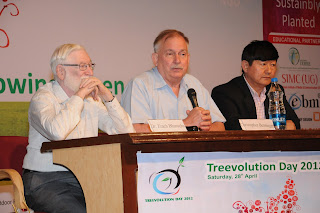ANECDOTES
ON ENVIRONMENT-A SHORT JOURNEY INTO THE PAST @ Tree Public Foundation
Post
retirement activities can be very challenging and occasionally very stimulating
and satisfying too. Faced as I am, with wide ranging activities , I declined an
invitation to be on a distinguished panel of experts on Environment- an
occasion designed to involve corporates, educationists, academics and students-
in the cause of protecting the environment.
A
young but determined founder of a NGO Tree Public who was the organizer of the talk
show, refused to accept my plea of ignorance. He repeatedly drew my attention
to the sterling work undertaken by the Armed forces of India, towards
protecting and improving our environment. Confronted by a fiercely committed
young man, I was obliged to put my thinking cap on, so that in the presence of
highly qualified experts, I could voice a layman’s perspective of the last 60 years,
before articulating the determination displayed by the Armed Forces to fight
all types of pollution in regard to environment.
Thanks
to this unique call form Tree Public, I was able to journey into my past to
introspect based on my observations; also with hind sight. This blog only
covers the journey backwards in time. Perhaps many of you of my vintage can
relate to my experience. If
so, we stand exposed, as those who let down the next generation, on crucial
issues pertaining to protection of our environment.
Economists
will tell us the relationship between per capita income and the will to address
environment related issues. It is said that crossing the barrier of US Dollar
5000(in PPP terms) is significant in appreciating the need to address pollution
related problems and taking proactive measures to reduce damage to the
environment. My early child hood memories are all about villages’ enroute to
coffee estates of the south. Poor and illiterate as they were, their commitment
to Mother Nature was so rich and their folk lore and anecdotes so telling on
the need to protect the environment from all forms of pillage and plundering,
that it had indeed left a deep impression on my sub-conscious mind. Nothing to
do with income or affluence? We were taught at every stage to understand flora
and fauna, coexist with nature, use herbal medicines for all forms of diseases,
and appreciate the interdependence of humans with flora and fauna. Most of all
we were urged to pass on by word of mouth so that knowledge acquired over centuries
is not forgotten or obliterated in the name of modern science.
If
Yajnavalkya Smriti the Indian Text on State craft and Jurisprudence, written in
5th century AD had a chapter on the ill effects of felling trees and
Kautalya’s Arthashashtra had advice on Forest Administration, why and how did
we lose track of our responsibilities towards protecting environment.?
Continuing
with the past, if I were to list the positives of our way of life in 1950’s,
some features stand out. Discipline and strict adherence to rule of law were
cornerstones of life. Even a simple Government run school in a taluka,was clean,
well maintained and well managed. The teachers were dedicated to the profession
and hence were much respected in the community. Punishments to erring students
were instant and the support of the parents to enforce such punishments was
unshakeable. Great emphasis was laid on environment consciousness and customs
and traditions. Energy efficiency even when electricity was inaccessible was
ingrained in us. Gobar, camphor, thatched roofs etc were eco friendly pesticides,
insecticides and renewable and affordable ingredients of consumption. Rivers
and lakes were kept spotlessly clean-no plastics, no effluents, least of all
human and animal faeces. Quality of water down -stream was the responsibility
of those dwelling up stream. Water holes and ponds were kept clean by village
and town administrators who were always at the service of the people. Trees
were never harmed.
And
then came the rat-race of my generation. Urbanisation, unruly, unplanned spread
of towns and cities and a strong urge to look outwards(towards the west) rather
than learn from our past. Overpowering consumerism and wanton destruction of
the environment soon followed. Rest is history.
The silver lining is the reappearance
of a little emphasis on the subject, in schools. My 13 year old granddaughter
can lecture me on how to protect our environment and show our concern for the
generations to follow. There is hope. After the terrible destruction caused
during WW1&2, in particular, destruction of Nagasaki and Hiroshima, have we
not recovered and to a great extent alleviated horrors of such destruction? Let
us put our shoulders to the wheel, no matter how weak!
Abhishek,
this is dedicated to you and your gallant friends at Tree Public Foundation.

.JPG)




